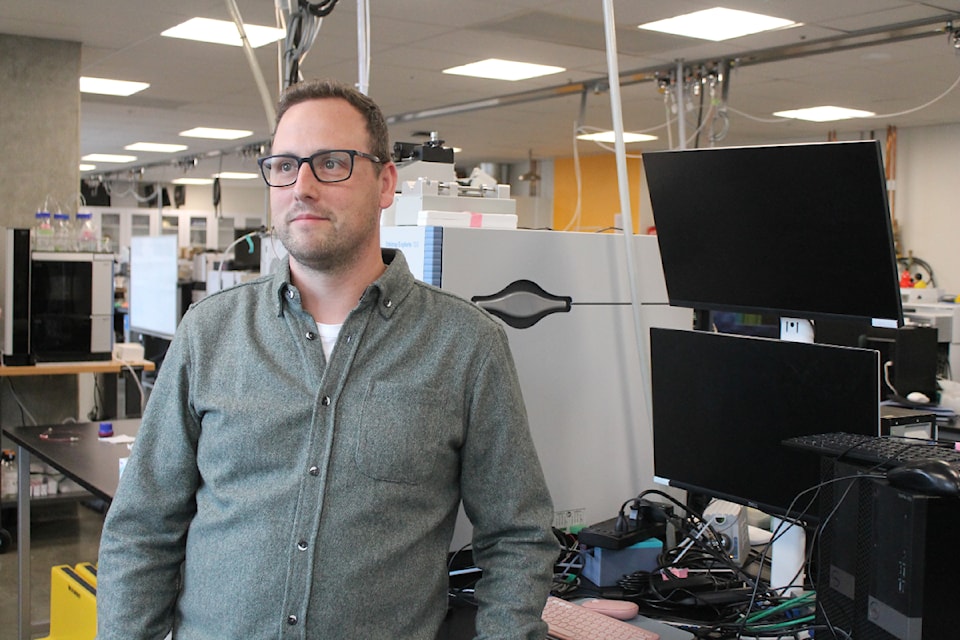Science
Researchers Develop Tools to Combat Cancer Immunotherapy Resistance

A team of researchers at Vancouver Island University is developing innovative tools to investigate why some cancerous tumours resist immunotherapies. Led by Professor Kyle Duncan, the project aims to create custom machinery that can analyze tumour metabolism, providing vital information to enhance treatment efficacy. Funded by grants from the Terry Fox Research Institute and the Michael Smith Health Research B.C. scholar program, this initiative began in 2023 and focuses on improving outcomes for patients with difficult-to-treat cancers.
Professor Duncan’s team is concentrating on pancreatic, ovarian, and pediatric bone cancers, which are often under-diagnosed and challenging to manage with standard therapies. The researchers are building a molecular map of these tumours to better understand their unique metabolic profiles. “Immunotherapies are a promising treatment, but solid tumours are sometimes resistant,” Duncan stated. “It’s unclear why these treatments only work for some people.”
To address this, the team is creating custom instrumentation that allows for detailed molecular analysis of tissue samples. Traditional methods, which often involve grinding tumour samples into a paste, fail to capture how molecules interact in their natural environment. This lack of context can obscure crucial information about how certain tumour regions may inhibit immune response.
The researchers are employing advanced engineering techniques, combining 3D printing with custom manufacturing to construct their tools in-house. All software controlling the equipment has also been developed internally, allowing the team to maintain full control over their experimental platform. This comprehensive approach enables them to pursue specific research questions effectively.
As part of their analysis, the team slices tissue samples very thinly, about one cell thick, and integrates their equipment with a state-of-the-art mass spectrometer. They use fine glass capillaries to create a “liquid bridge,” which allows desorption of molecules from tissue surfaces into a flowing liquid. This process generates a molecular “fingerprint” that helps in mapping the tissue’s surface characteristics.
The goal is to reveal the contextual distribution of molecules throughout the tumour, which can indicate which micro-environments may hinder immune cells. “The purpose of this grant is really to try to figure out what is the contextual distribution of the molecules throughout the tumour and which micro-environments cause the immune cells to stop working,” Duncan explained.
As the project evolves, Duncan is keen to automate parts of the analysis process. Currently, team members must manually operate the equipment for extended periods, often sitting at the machine for seven hours a day to generate these complex maps. “Ideally, we would like to automate the imaging process,” he said. “The aim is to simplify the workflow, although we face technical barriers that restrict the number of successful tissue images we can obtain.”
The research team is committed to transparency and plans to make all data and designs publicly available upon project completion. For more information about the project and updates, interested individuals can visit Duncan’s website at http://wordpress.viu.ca/duncan.
By creating a clearer understanding of tumour metabolism and resistance, this research could ultimately lead to more effective cancer treatments, enhancing the potential of immunotherapies and improving patient outcomes.
-

 Science3 months ago
Science3 months agoToyoake City Proposes Daily Two-Hour Smartphone Use Limit
-

 Health4 months ago
Health4 months agoB.C. Review Reveals Urgent Need for Rare-Disease Drug Reforms
-

 Top Stories4 months ago
Top Stories4 months agoPedestrian Fatally Injured in Esquimalt Collision on August 14
-

 Technology3 months ago
Technology3 months agoDark Adventure Game “Bye Sweet Carole” Set for October Release
-

 World3 months ago
World3 months agoJimmy Lai’s Defense Challenges Charges Under National Security Law
-

 Lifestyle4 months ago
Lifestyle4 months agoVictoria’s Pop-Up Shop Shines Light on B.C.’s Wolf Cull
-

 Technology3 months ago
Technology3 months agoKonami Revives Iconic Metal Gear Solid Delta Ahead of Release
-

 Technology3 months ago
Technology3 months agoApple Expands Self-Service Repair Program to Canada
-

 Technology3 months ago
Technology3 months agoSnapmaker U1 Color 3D Printer Redefines Speed and Sustainability
-

 Technology3 months ago
Technology3 months agoAION Folding Knife: Redefining EDC Design with Premium Materials
-

 Technology4 months ago
Technology4 months agoSolve Today’s Wordle Challenge: Hints and Answer for August 19
-

 Business4 months ago
Business4 months agoGordon Murray Automotive Unveils S1 LM and Le Mans GTR at Monterey









